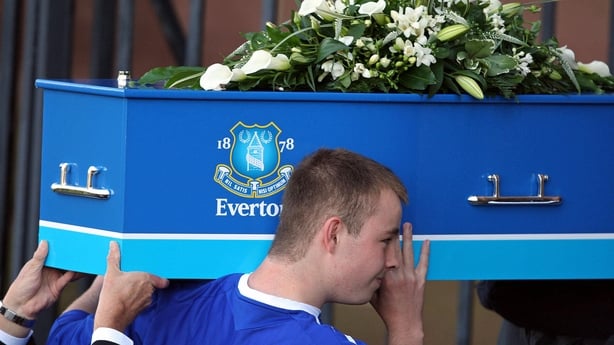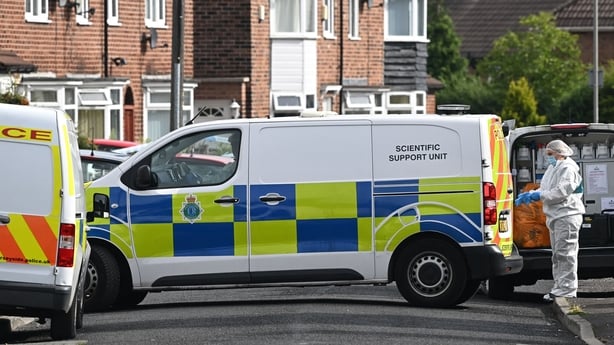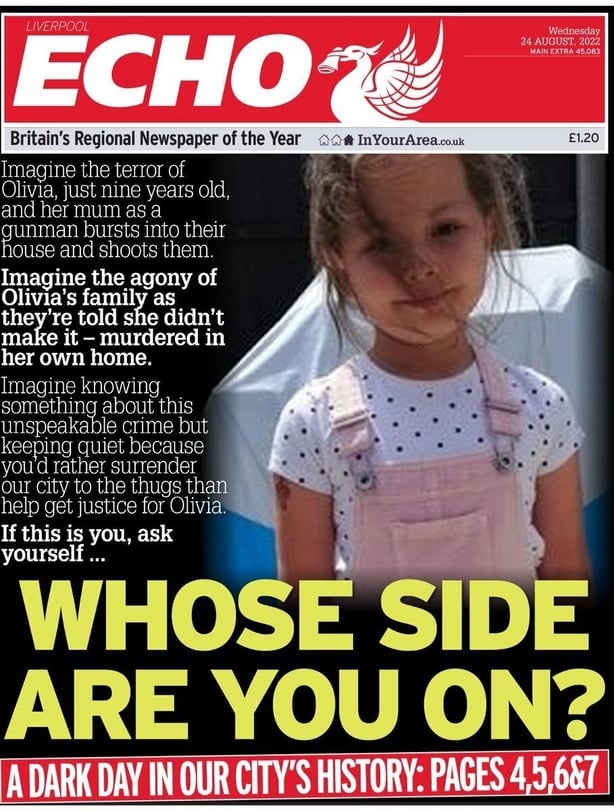Fifteen years on from the murder of 11-year old Rhys Jones in Liverpool, the city has been left reeling from another child shooting, this time of 9-year-old Olivia Pratt-Korbel.
Many had hoped that the killing of Rhys Jones, a young Everton fan who was shot in the Croxteth area as he made his way home from football practice, would be a turning point for Liverpool.
Rhys Jones was shot in the neck in broad daylight by a gang member in what police in Merseyside said at the time should have been a watershed moment.
Sean Mercer, from the Croxteth area and who was 16 at the time, was jailed for life in 2008 for Rhys's murder and ordered to serve a minimum of 22 years.
He was a member of the Croxteth Crew gang and was taking aim at a rival gang member outside the Fir Tree pub when Rhys was killed.
A number of other members of the gang were also imprisoned for their part in his death.
The 11-year-old's anniversary is marked each August by his favourite football team, Everton.
Our thoughts are with the family and friends of Rhys Jones today - 15 years on from his tragic passing.
We'll never forget you, Rhys. 💙 pic.twitter.com/MyB6KJrElA
— Everton (@Everton) August 22, 2022
A fund set up in his memory by his mother Melanie, father Steve and older brother Owen ran a 'Join a team, not a gang' campaign in order to encourage young people to get involved in sport and not criminality.
His local team Fir Tree FC, even travelled to Belfast in 2011 to take part in a tournament in his honour. His father, Steve Jones, said at the time his son would have had "a smile as wide as the Mersey" to have taken part in that tournament.
In 2013, the Rhys Jones Community Centre was opened in his memory including all weather football pitches and an Everton mosaic.

The Alt Valley Community Trust, which runs the centre, offers apprenticeships to young people and says deprivation - not gangs - is the key problem for young people in the city.
Assistant mayor of Liverpool Harry Doyle said it was "unthinkable" that another child had been killed on the anniversary of Rhys's murder.
Harry Doyle, the local councillor for the Knotty Ash area where the latest murder happened, was the same age as Rhys Jones when he was shot on 22 August 2007.
He remembers the incident and the reaction to it: "I was the same age as Rhys 15 years ago and I remember the atmosphere in the city, and not just the city, nationwide around the shooting of Rhys Jones, was absolutely awful," he said.
"I look at families on the doorsteps this morning, equally as worried and concerned and devastated."
He says his own mother would not allow him to walk to school 15 years ago and now some children in Liverpool are reported to be afraid to play on the streets.
"It's unbelievable that this has happened again 15 years on. We thought we had ridded ourselves of this violence," he says.
He urged anyone with information to contact Crimestoppers or Merseyside Police directly. A community hub called 'The Drive’ is also being opened daily in the area to provide local support and a confidential ear to anyone who does not want to speak to the police directly.
Merseyside Police, who have this week been left defending their record on stamping our gun crime, insist a lot has changed in the city over the last 15 years.
Merseyside Police and Crime Commissioner Emily Spurrell told BBC Breakfast this morning that they are now under intense pressure to find Olivia’s killer: "I think it's intense... We have pulled in support from neighbouring forces to make sure that we can put everything into this investigation to find out who's done this."

She says it was important that there were visible police resources in the community, but she denied that nothing had changed in Liverpool since the killing of Rhys Jones.
"I think we're a very different city to what we were 15 years ago," she says.
"The culture is very different - I think if you'd looked at before this week, you would see a downward trajectory, we have the lowest firearm discharges in 21 years."
Nevertheless, Olivia Pratt-Korbel's death was the third fatal shooting in Liverpool in just a week, placing crime in the city firmly back in the spotlight.
In the early hours of Sunday morning, a 28-year-old woman, Ashley Dale was shot dead in the back garden of her home, in what police believe was a case of mistaken identity.
Her younger brother, Lewis Dunne, was killed in 2015 at the age 16 after a gang mistook him for a rival gang member.
Police are still searching for Ms Dale’s killer and only yesterday they released CCTV footage of a car being driven in the area, shortly before the incident was reported.
APPEAL | Detectives investigating the fatal shooting of Ashley Dale have released CCTV footage of a car seen on Leinster Rd which may be vital to enquiries. Contact (https://t.co/Zu7CgdSmL2) with ref: 22000615873.https://t.co/ixV6LejJ2o More here:https://t.co/nQsQDQi0D3
— Merseyside Police (@MerseyPolice) August 23, 2022
They are also searching for suspects in the case of Sam Rimmer from the Bootle area of Merseyside. Known as "Little-man Sam," he was killed late last Tuesday night, 16 August, when he was hit in the chest after shots were fired by a group of men on bikes.
In an appeal on Twitter, Merseyside Police Chief Constable Serena Kennedy said she knew the community had been "absolutely rocked" by all three incidents.
"Olivia’s family is the third family to have been devastated by gun crime in the past week and our thoughts also go out to the families of Sam Rimmer and Ashley Dale and the investigations into their murders continue at pace."
Part 1 of @merpolchiefcon message to the community following the tragic murders of 9-year old Olivia Pratt-Korbel, Ashely Dale and Sam Rimmer.
If you have any information, including CCTV, dashcam or smart doorbell footage please get in touch. (1/2) pic.twitter.com/FknkMrQZ1o
— Merseyside Police (@MerseyPolice) August 23, 2022
Appealing to what she called the "criminal fraternity" in the city, she said: "The murder of a 9-year-old girl on the streets of Merseyside crosses all boundaries. You know who is responsible for this. Please look into your souls, look at your consciences, clear your consciences and come forward."
Her sentiments were echoed in the front page of today’s Liverpool Echo which she retweeted.
A headline in the paper urged those who might be keeping quiet and harbouring information about Olivia’s murder not to allow the city of Liverpool to surrender to "thugs," and to ask themselves "Whose side are you on?"

Reflecting on the past 15 years, the Auxilliary Bishop of Liverpool Tom Williams said he also thought the city had changed since the death of Rhys Jones.
He said: " I think Liverpool is a different city to what it was 15 years ago. I imagine the community now is feeling a bit gobsmacked, frightened, anxious and concerned, and I think in some ways it will draw them closer together."
He added: "If people are scared to come forward, we need to know what they are scared of. You can't blame people for being frightened.
He urged those living in the Merseyside area not to be split further apart by the crime: "People need to talk to one another and to be able to share," he said.
Additional reporting PA







